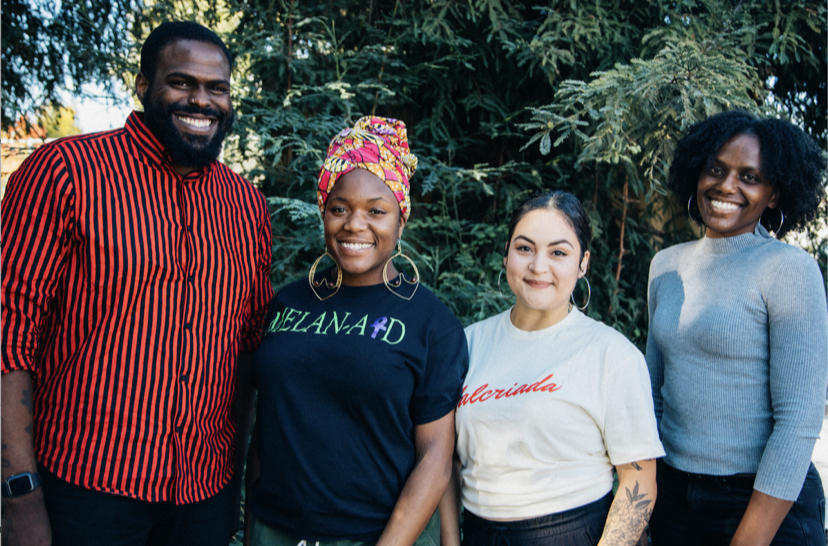Bay Area
A Deep East Oakland Based Grocery Coop is Opening
“The community here deserves life and good health,” said Romo. “And so much of that is literally what we eat.”

The four worker owners of a new grocery store in deep East Oakland want to bring more healthy food options to the area through a cooperative model. The DEEP Grocery Coop opened for online sales on April 7. By Fall, the worker owners plan to open a storefront.
“We’re coming together for the cause of changing food access in the deep East Oakland community,” said worker owner Daniel Harris-Lucas. “We’re trying to create social change and not necessarily getting into it for profit.”
Deep East Oakland currently has limited options for healthy food. While a large chain grocery store, Foods Co., operates in the area, its organic and fresh foods sections are limited, and the store is still several miles from where many deep East Oakland residents live.
Deep East Oaklanders largely find themselves eating what’s most accessible: highly processed foods sold in the many liquor stores in or near their neighborhoods. Worker owners of the DEEP Grocery Co–op plan to stock lots of healthy foods including fresh, local and organic vegetables and fruits.
All four DEEP Grocery Coop worker owners live in deep East Oakland and are passionate about eating healthy, which can be challenging. Worker owner Yolanda Romo drives out to Berkeley Bowl to buy her groceries. She says she never sees her neighbors there, and is saddened that she has to shop at a business in a more affluent city instead of being able to get healthy foods near her neighborhood.
“The community here deserves life and good health,” said Romo. “And so much of that is literally what we eat.”
The DEEP Grocery Coop’s worker owners acknowledge that price is an important part of making healthy food accessible, and they want their foods to be affordable for local residents.
They have plans to receive grant funding that will allow those with food stamps to buy California grown produce at a 50% discount. As a small cooperative, with no boss that expects a large profit, the worker owners can focus instead on sustaining the store and themselves while keeping prices as low as they can for the community.
They also are making connections with small local Black– and Brown–led farms, like Raised Roots, who find it difficult to get their products into larger chain stores.
Education is key to The DEEP Grocery Coop’s project, as the knowledge of how to eat healthy is less accessible to the largely Black and Brown population of East Oakland, and is falsely associated as only being for white people. As an example, Romo points out quinoa, a whole–grain seed that is high in protein fiber and B vitamin.
“Quinoa is a super–cheap Peruvian necessity and someone branded it,” Romo said. “That branding isn’t catered to communities of color but to white people who have more choices.”
To share knowledge, worker owners have done free cooking demonstrations and informative healthy food discussions. They share knowledge about healthy foods through instagram.
Their instagram account also serves as a place to educate the public about the cooperative model, which worker owners say allows them more autonomy. As they begin to sell foods online and eventually open their in-person store, they hope to serve as a model for other deep East Oakland residents who want to create businesses that better serve their community.
“I hope this inspires others in the community to be worker owners and to make decisions and run their businesses the way they want to do it,” said Romo. “The top–down model that we see everywhere and the huge corporate chains that surround East Oakland haven’t helped.”
Decision making in the DEEP Grocery Coop will be more localized, allowing it to cater to the deep East Oakland Community. Worker owner Jameelah Lane expects the store to be full of “things that resemble East Oakland” like vibrant colors, graffiti painting and good music. She wants the store to have “culturally recognizable foods” like bean pies and tamales.
The DEEP Grocery Coop worker owners are not the only people who helped create the store. Mandela Grocery Cooperative, a non-profit youth urban farm project called Acta Non Verba, and an organization that helps launch Bay Area Black–led cooperatives called Repaired Nation, all acted as a steering committee to help train and guide the worker owners during the project’s formation.
But, as originally planned, all those organizations have given full control to the worker owners at this point. The worker–owner staff are still relatively new to each other, with the full four–person crew not coming together until last summer. They are excited about what they have been able accomplish in such a short time and about starting to bring more healthy foods to deep East Oakland.
“We want to inspire people to be change-makers instead of waiting for it,” said Harris-Lucas. “We’ve been able to really grow something just from the common love for our community.”
Anyone throughout the Bay Area who wants to support the coop can now order food on their website: https://thedeepgrocery.coop, and arrange a curbside pickup. People can also donate to support the project through the store’s gofundme campaign.
Activism
Oakland Post: Week of April 24 – 30, 2024
The printed Weekly Edition of the Oakland Post: Week of April 24 – 30, 2024

To enlarge your view of this issue, use the slider, magnifying glass icon or full page icon in the lower right corner of the browser window. ![]()
Alameda County
DA Pamela Price Stands by Mom Who Lost Son to Gun Violence in Oakland
Last week, The Post published a photo showing Alameda County District Attorney Pamela Price with Carol Jones, whose son, Patrick DeMarco Scott, was gunned down by an unknown assailant in 2018.

Publisher’s note: Last week, The Post published a photo showing Alameda County District Attorney Pamela Price with Carol Jones, whose son, Patrick DeMarco Scott, was gunned down by an unknown assailant in 2018. The photo was too small for readers to see where the women were and what they were doing. Here we show Price and Jones as they complete a walk in memory of Scott. For more information and to contribute, please contact Carol Jones at 510-978-5517 at morefoundation.help@gmail.com. Courtesy photo.
Bay Area
State Controller Malia Cohen Keynote Speaker at S.F. Wealth Conference
California State Controller Malia Cohen delivered the keynote speech to over 50 business women at the Black Wealth Brunch held on March 28 at the War Memorial and Performing Arts Center at 301 Van Ness Ave. in San Francisco. The Enterprising Women Networking SF Chapter of the American Business Women’s Association (ABWA) hosted the Green Room event to launch its platform designed to close the racial wealth gap in Black and Brown communities.

By Carla Thomas
California State Controller Malia Cohen delivered the keynote speech to over 50 business women at the Black Wealth Brunch held on March 28 at the War Memorial and Performing Arts Center at 301 Van Ness Ave. in San Francisco.
The Enterprising Women Networking SF Chapter of the American Business Women’s Association (ABWA) hosted the Green Room event to launch its platform designed to close the racial wealth gap in Black and Brown communities.
“Our goal is to educate Black and Brown families in the masses about financial wellness, wealth building, and how to protect and preserve wealth,” said ABWA San Francisco Chapter President LaRonda Smith.
ABWA’s mission is to bring together businesswomen of diverse occupations and provide opportunities for them to help themselves and others grow personally and professionally through leadership, education, networking support, and national recognition.
“This day is about recognizing influential women, hearing from an accomplished woman as our keynote speaker and allowing women to come together as powerful people,” said ABWA SF Chapter Vice President Velma Landers.
More than 60 attendees dined on the culinary delights of Chef Sharon Lee of The Spot catering, which included a full soul food brunch of skewered shrimp, chicken, blackened salmon, and mac and cheese.
Cohen discussed the many economic disparities women and people of color face. From pay equity to financial literacy, Cohen shared not only statistics, but was excited about a new solution in motion which entailed partnering with Californians for Financial Education.
“I want everyone to reach their full potential,” she said. “Just a few weeks ago in Sacramento, I partnered with an organization, Californians for Financial Education.
“We gathered 990 signatures and submitted it to the [California] Secretary of State to get an initiative on the ballot that guarantees personal finance courses for every public school kid in the state of California.
“Every California student deserves an equal opportunity to learn about filing taxes, interest rates, budgets, and understanding the impact of credit scores. The way we begin to do that is to teach it,” Cohen said.
By equipping students with information, Cohen hopes to close the financial wealth gap, and give everyone an opportunity to reach their full financial potential. “They have to first be equipped with the information and education is the key. Then all we need are opportunities to step into spaces and places of power.”
Cohen went on to share that in her own upbringing, she was not guided on financial principles that could jump start her finances. “Communities of color don’t have the same information and I don’t know about you, but I did not grow up listening to my parents discussing their assets, their investments, and diversifying their portfolio. This is the kind of nomenclature and language we are trying to introduce to our future generations so we can pivot from a life of poverty so we can pivot away and never return to poverty.”
Cohen urged audience members to pass the initiative on the November 2024 ballot.
“When we come together as women, uplift women, and support women, we all win. By networking and learning together, we can continue to build generational wealth,” said Landers. “Passing a powerful initiative will ensure the next generation of California students will be empowered to make more informed financial decisions, decisions that will last them a lifetime.”
-

 Activism4 weeks ago
Activism4 weeks agoOakland Post: Week of March 27 – April 2, 2024
-

 #NNPA BlackPress4 weeks ago
#NNPA BlackPress4 weeks agoBeloved Actor and Activist Louis Cameron Gossett Jr. Dies at 87
-

 Community1 week ago
Community1 week agoFinancial Assistance Bill for Descendants of Enslaved Persons to Help Them Purchase, Own, or Maintain a Home
-

 Activism3 weeks ago
Activism3 weeks agoOakland Post: Week of April 3 – 6, 2024
-

 Business2 weeks ago
Business2 weeks agoV.P. Kamala Harris: Americans With Criminal Records Will Soon Be Eligible for SBA Loans
-

 Activism2 weeks ago
Activism2 weeks agoOakland Post: Week of April 10 – 16, 2024
-

 Community2 weeks ago
Community2 weeks agoAG Bonta Says Oakland School Leaders Should Comply with State Laws to Avoid ‘Disparate Harm’ When Closing or Merging Schools
-

 Community1 week ago
Community1 week agoOakland WNBA Player to be Inducted Into Hall of Fame

























































